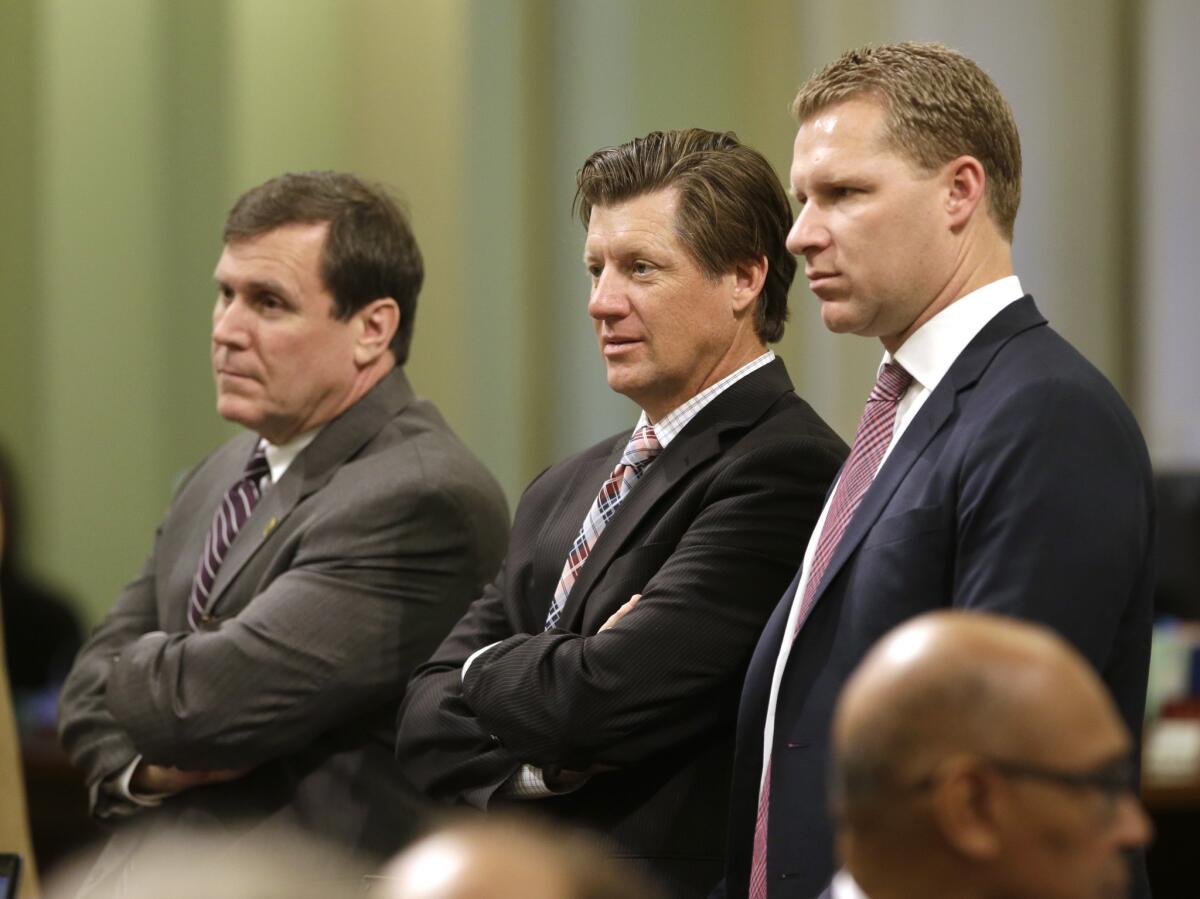GOP legislators voting for taxes? It’s not likely to happen again anytime soon

GOP Assemblymen Scott Wilk, left, Brian Jones and Minority Leader Chad Mayes listen during a debate at the Capitol.
Reporting From Sacramento — The simplest messages in politics are usually the most powerful, with a politician on the wrong side of that simplicity scrambling to explain the unexplainable.
For California Republicans, the messages don’t come any simpler, or potentially devastating on election day, than “no new taxes.”
“From the viewpoint of conservative Republicans, it’s hard to find a bigger sin,” said Dave Cogdill, who represented part of the Central Valley for 12 years in the Legislature.
Join the conversation on Facebook >>
Cogdill knows well the lethal nature of the anti-tax message. Seven years ago last month, during late-night negotiations over a $41-billion budget deficit, the veteran Republican’s colleagues ousted him as GOP leader in the state Senate.
“I lost my job that night,” Cogdill said.
Cogdill had helped Democrats and former Gov. Arnold Schwarzenegger craft a multibillion-dollar tax increase to close the gap in the state budget, an action that outraged activists and radio talk show hosts alike. It also was the last tax increase of its kind at the state Capitol for the better part of a decade.
That streak ended with Monday’s vote in the Legislature on a new $1.1-billion tax on health insurance plans. While Republicans had cast healthcare tax votes since 2009, those were for extensions of an existing levy on only a few health plans. The new tax signed into law by Gov. Jerry Brown on Tuesday broadly applies to all managed care plans and thus has the potential to affect millions of Californians.
And like previous tax hike discussions, most legislative Republicans again recoiled at the thought of casting a vote in support. The proposal’s final language was the product of intense negotiations, but it languished for three weeks as GOP lawmakers mulled its political implications.
See the most-read stories this hour >>
The first sign of movement came when the California Chamber of Commerce announced its support for the tax Feb. 11. A week later, the influential Howard Jarvis Taxpayers Assn. — keeper of the anti-tax flame — announced it would remain neutral on the proposal.
“When they take a neutral position or a support position, we’ve got to take that seriously,” said Assemblyman Brian Jones (R-Santee), one of the most conservative members of the Assembly GOP caucus. “They don’t control our votes, but we do listen to their opinion.”
One Democratic legislator was seen exclaiming “Wow!” as Jones spoke in favor of the bill during Monday’s floor debate. In all, 11 Republicans in the Assembly and two in the Senate voted for the healthcare tax.
Even then, some argued that it was a vote for “tax reform” or went so far as to call it an actual “tax cut,” pointing to the net positive fiscal effect on some of California’s largest insurers. None of that, though, took the sting out of the resulting news coverage for those Republicans who insist the party’s core principles are linked to opposing taxes, not supporting them.
“I’ve talked to a lot of donors and activists who are disillusioned about what happened,” said Jon Fleischman, a former member of the California Republican Party leadership who runs a well-known conservative website. “What you’ve now done is muddy the message of Republicans. There’s now an asterisk after the word ‘taxes.’”
Fleischman spent several weeks writing columns urging Republican legislators to reject the healthcare tax, and argues that helping Democrats pass new taxes won’t stop the bleeding in the GOP’s size of the California electorate. New registation data last week showed less than 28% of the state’s voters are Republicans, a drop of three percentage points from 2012.
“If you don’t have a definition,” Fleischman said, “you can’t build a base.”
Assembly Republican leader Chad Mayes (R-Yucca Valley) rejected any suggestion that Monday’s bipartisan tax vote sends the wrong message about his party’s core values. “We believe that taxes should be as low as possible,” he said in an interview immediately after the vote. “The debate is, what’s the way to properly fund government?”
That mirrors the message of Republican lawmakers who voted for the 2009 state budget tax hike. None of them ever regained their political footing, and those who didn’t voluntarily leave office were defeated in 2010.
Assemblyman Matthew Harper (R-Huntington Beach) opposed the new healthcare tax, but he didn’t rise to criticize his colleagues during Monday’s debate, and even complimented their efforts to secure more money for developmental disability programs as part of the overall package.
Harper said Republicans simply don’t have enough campaign cash to fairly fight the political perception that they may be going back on their anti-tax promises. “Forgive some Republicans if they’re a little bit more sensitive when the media narrative gets a little ahead of itself, and people are very sensitive to the language that’s being used.”
Public polling suggests the fear is well-founded. In a December survey by the nonpartisan Public Policy Institute of California, adults were generally split over whether they prefer more services and higher taxes or lower taxes and fewer services. But there was little ambivalence among Republicans. Seventy-seven percent of Republicans surveyed said they’d rather have low taxes and fewer services — a 25-point gap compared to indepdendent voters and a 35-point gap with Democrats.
“It is such a powerful issue,” said Matt Klink, a Los Angeles-based Republican political strategist. “For Republican orthodoxy, there’s a reflex reaction to oppose all tax increases.”
But the unsettled political debate is whether current voters will reward or punish GOP politicians who eschew a firm tax pledge. Klink believes that the pressure to toe the line is even more intense now that the GOP base has receded down to its most die-hard ranks.
“The anti-tax message is at the core of what makes a Republican in California,” he said. “Before you know it, the party’s going to meet in a phone booth because so few people adhere to what those principles are.”
Still, no one expects another tax approval like the one for health programs anytime soon. Capitol staffers point out that since voters approved a 2010 ballot measure requiring supermajority votes on hiking fees as well as taxes, there is little room to maneuver. And legislators have made little to no progress on the governor’s call for new revenue to help fund transportation programs. Opposition to new levies on drivers is deep and wide among Sacramento’s Republican ranks.
“I’m not even going to have a conversation about that,” Mayes said.
Follow @johnmyers on Twitter, sign up for our daily Essential Politics newsletter and listen to the weekly California Politics Podcast.
Times staff writer Melanie Mason conributed to this report.
ALSO:
Everything you need to know about the healthcare tax the Legislature just passed
Here’s what the Assembly GOP wants in negotiations for healthcare-plans tax
Revamping the tax on healthcare plans proves tougher than Gov. Brown thought
More to Read
Get the L.A. Times Politics newsletter
Deeply reported insights into legislation, politics and policy from Sacramento, Washington and beyond. In your inbox three times per week.
You may occasionally receive promotional content from the Los Angeles Times.











